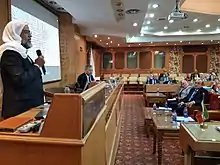Coordination of Islamic Colleges
Coordination of Islamic Colleges (CIC) is an academic governing body functioning as an Islamic university in Kerala, India.

Sayed Hyderali Shihab Thangal, the Kerala State president of Indian Union Muslim League and the vice president of Samastha Kerala Jamiyyathul Ulama, is the rector of the CIC while Abdul Hakeem Faizy,[1] an Islamic scholar and the executive board[2] member of Cairo-based The League of Islamic Universities (LIU), and a representative from India at the International Muslim Communities Congress, is the coordinator.
At present there are 81 Islamic colleges including 32 woman-only seminaries affiliated to the CIC.[3]
Wafy and Wafiyya courses
The CIC gave shape to integrated Islamic courses for boys and girls, designed by combining both Islamic and secular streams of education.[4] The CIC's programme for boys includes preparatory, undergraduate and postgraduate courses in Islamic studies and a recognized bachelor's degree in a secular discipline. The PG programme consists of seven departments under three faculties namely Theology, Islamic Sharia and Language and Culture.
The programme for girls combines preparatory and undergraduate courses in Islamic studies with a recognized bachelor's degree in a secular discipline. CIC's woman-only seminaries are making higher studies in Islamic theology accessible to girls. Those who successfully complete the P.G course for boys are conferred with the title Wafy while those who pass out of the course for girls are given the title Al Wafiyya.[5]
Integrated curriculum

The CIC has designed its academic programmes by modifying the traditional Nizamiyah syllabus which had been followed by Islamic colleges and universities across India for centuries. The Nizami syllabus was first developed by Indian scholar Mulla Nizamuddin in the 12th century. The modification was effected with focus on joining Islamic and secular studies,[6] by introducing government-approved courses in a range of academic disciplines such as science, commerce and humanities.
Compulsory social service
The CIC makes it mandatory for its students to complete stipulated hours of social services (192 hours for Wafy and 100 Hours for Wafiyya) before completing the course. The services coming under this purview include renovation of Mahals (village bodies undertaking the administration of mosques); bringing the fruits of various government initiatives to the lower strata of society; taking care of the diseased and the underprivileged; initiatives to fight against social evils and misdemeanours; preservation of nature and natural resources; generating awareness on peaceful coexistence of various religious communities, Islamic propagation etc.
Headquarters and postgraduate campus

Established in 2000 and registered with the Government of Kerala, CIC is currently headquartered in Markazu Tharbiyathil Islamiyyah,[7][8] in the district of Malappuram. CIC is currently setting up a university campus with Postgraduate blocks for Al Wafy and Al Wafiiya Course at Kalikavu in Malappuram district. The campus launched its first phase in 2016 by opening the academic block. The campus comprises administrative block, academic blocks for different departments, research centre, audio visual theatre, live e-class room, students hostel, auditorium and canteen. The campus is being erected on 15 acres (6.1 hectares) of land donated by Akkarapeedika Baappu Haji [9] from Kalikavu.
Agreements and recognition
The CIC does not project itself as a university, but it is an academic authority functioning as a university by designing the curriculum and courses, conducting examinations, issuing certificates etc. CIC has been certified ISO9001:2015. The body has at present entered into academic and cultural cooperation, and signed memoranda of understanding (MoU) to this effect, with Azhar University, Cairo; University of Cairo; League of Islamic Universities; Arab League Educational, Cultural and Scientific Organisation (ALESCO); Aligarh Muslim University, New Delhi, India; Hamdard University, India; Distance Study Centre, Aligarh Muslim University; Distance Study Centre, University of Calicut; Al Azhar Alumni, Cairo; Academy of Arabic Language, Cairo; Ministry of Religious Affairs, Egypt; National Council for Promotion of Urdu Language (NCPUL) of the Central Governmentof India.
References
- TwoCircles.net. "Abdul Hakeem Faizy Adrisseri: The first Indian to join the governing body of League of Islamic Universities – TwoCircles.net". twocircles.net.
- "PEOPLE: Abdul Hakeem Faizy nominated to the Executive of League of Islamic Universities – Indian Muslim Observer". indianmuslimobserver.com.
- wafycic.com. "Affiliated Colleges-wafycic.com". wafycic.com.
- thehindu.com. "Knowledge synthesis to be theme of Wafy fete- thehindu.com". thehindu.com.
- "Islamic education in India: All-female madrassas: Of women, by women and for women – Qantara.de".
- thehindu.com. "Wafi fest from today- thehindu.com". thehindu.com.
- http://markazvalanchery.com/
- http://archive.qatar-tribune.com/news.aspx?n=2108C2E3-70BE-48FB-AD75-001163E5C7EE&d=20140210%5B%5D
- Deccanchronicle.com. "A P Bapu Haji has only acres to give away – Deccanchronicle.com". deccanchronicle.com.
